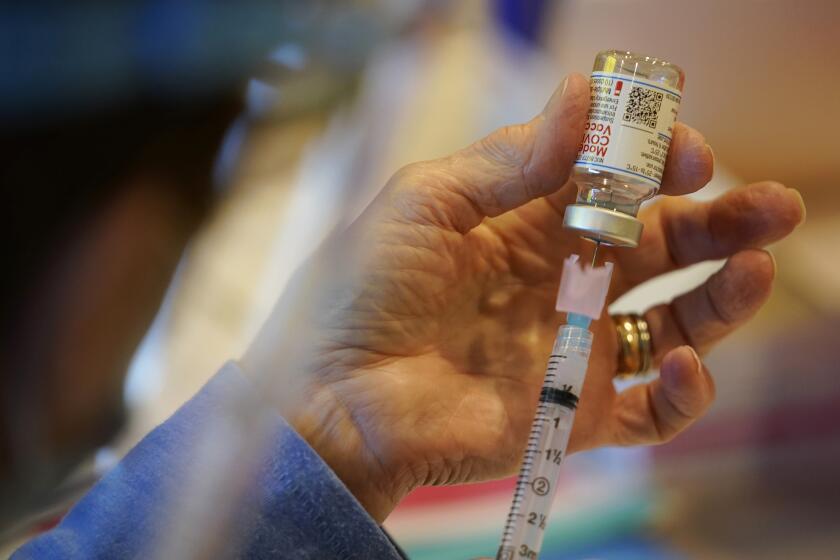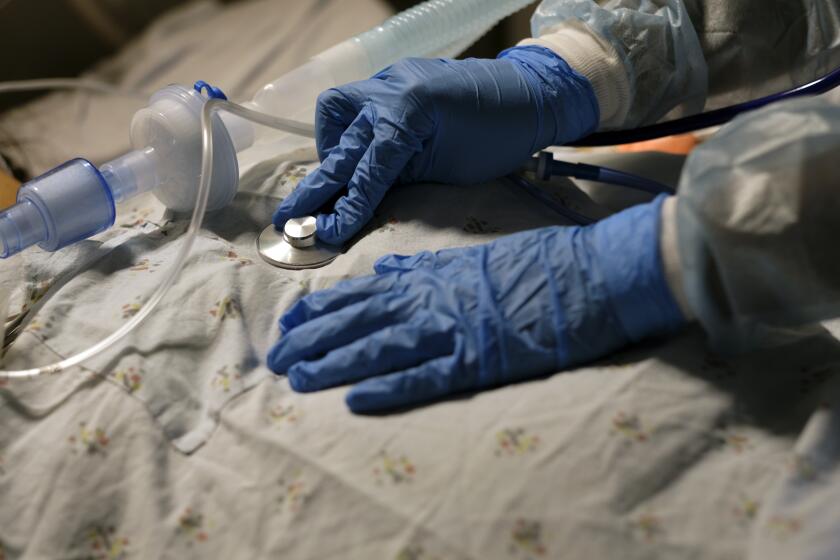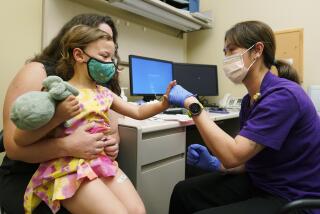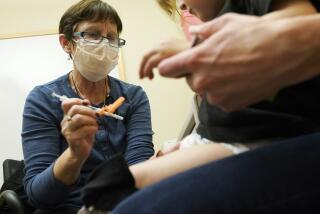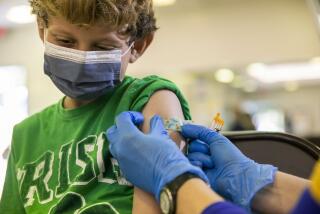Studies confirm COVID-19 vaccine’s effectiveness in teens, even against Delta
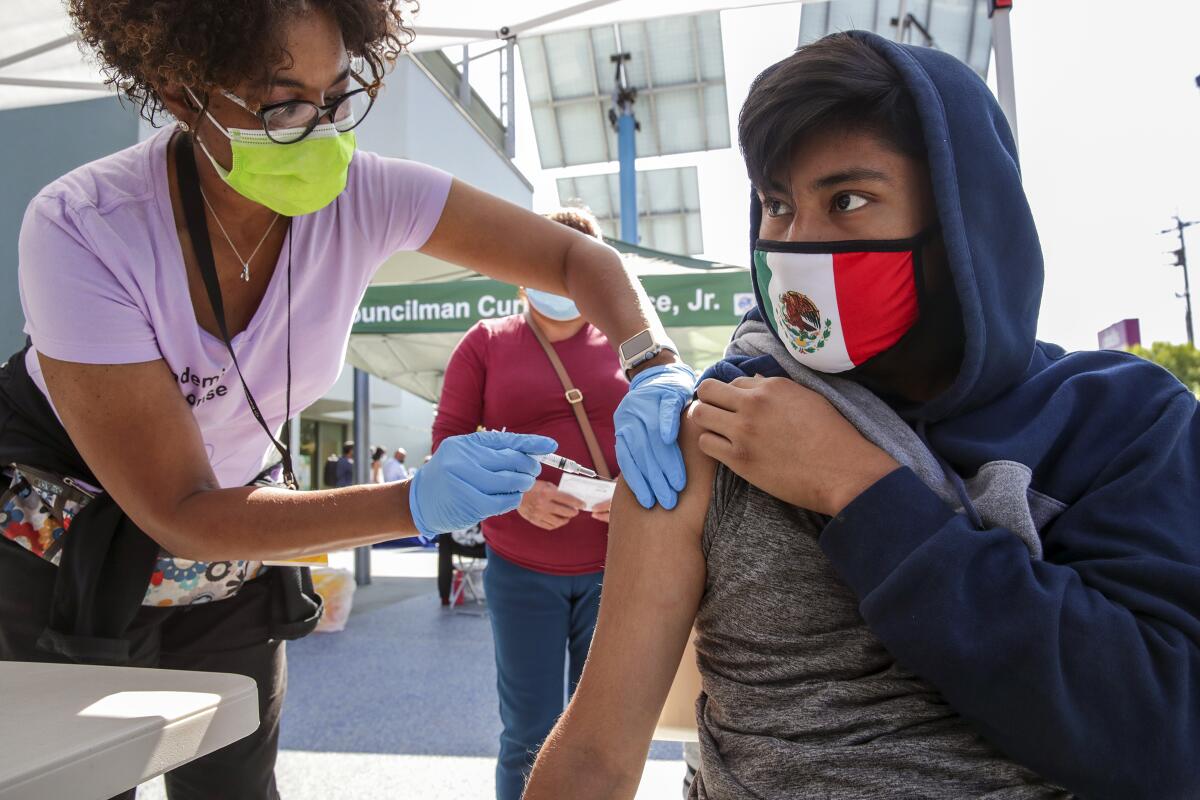
When the U.S. Food and Drug Administration authorized the first COVID-19 vaccine for use in adolescents as young as 12, regulators based their decision on clinical trial data collected before the Delta variant became the dominant coronavirus strain. That left open the question of whether the vaccine’s real-world protection was still as good as advertised.
Two new studies provide strong reassurance that the answer is yes.
Even when confronted by the highly transmissible Delta variant, the vaccine made by Pfizer-BioNTech greatly reduced the risk of coronavirus infection, COVID-19 illness and hospitalization among teens.
The results show why it’s “imperative” that the shots be administered to unvaccinated adolescents across the U.S., one of the research teams wrote Tuesday in a study published by the Centers for Disease Control and Prevention. As of Monday, 54% of Americans ages 12 to 15 and 46% of those ages 16 or 17 were not fully vaccinated against COVID-19, they noted.
The study, which appeared in the CDC’s Morbidity and Mortality Weekly Report, examined data from 19 pediatric hospitals in 16 states. Researchers compared 179 patients who were treated for COVID-19 and 285 patients from the same hospitals who were treated for other conditions.
All the patients were between the ages of 12 and 18, and they were admitted between June 1 and Sept. 30, when the Delta variant was responsible for most coronavirus infections in the U.S.
Among the 179 patients with COVID-19, only six — or 3% — had received both doses of the Pfizer-BioNTech vaccine at least 14 days before they came to the hospital. The remaining 97% of COVID-19 patients were unvaccinated. (Teens who were partially vaccinated were not included in the study.)
Lab tests and real-world experience offer reassuring evidence that COVID-19 vaccines offer a high level of protection against the Delta variant.
By comparison, among the 285 patients in the control group, 93 — or 33% — were fully vaccinated against COVID-19, and the remaining 67% were unvaccinated.
By comparing those two groups, the researchers calculated that the Pfizer-BioNTech vaccine was 93% effective at preventing COVID-19 hospitalizations among adolescents, even in the Delta era.
The vaccine appeared to do an even better job of preventing the most critical cases of COVID-19. Among the patients with the disease, 77 had to be admitted to the intensive care unit, including 29 who required mechanical ventilation or other life-support interventions. Two of those patients died.
None of the 77 patients who were treated in the ICU had been vaccinated.
The study “reinforces the importance of vaccination to protect U.S. youths against severe COVID-19,” the authors wrote.
The second study focused on the vaccine’s ability to reduce the risk of coronavirus infection and cases of COVID-19, including illnesses with only mild symptoms. It was based on records of 94,354 adolescents in Israel who received the Pfizer-BioNTech vaccine between June 8 and Sept. 14, along with records of 94,354 other teens who were matched on the basis of demographic and health data but were not vaccinated for COVID-19.
Among unvaccinated COVID-19 patients, infection with the Delta variant doubles the risk of needing hospital treatment, a study finds.
All the participants were between the ages of 12 and 18, and none had experienced a known coronavirus infection prior to joining the study. The Delta variant accounted for more than 95% of new cases in Israel during the study period, the researchers noted.
The vaccinated adolescents were tested for active coronavirus infections at a rate of 9.4 tests per 100 people per week. That was slightly less than the 9.9 tests per 100 people per week among the unvaccinated teens, but it was similar enough that any difference in infection rates couldn’t be attributed to the fact that one group was tested more frequently than the other.
The researchers found that the vaccine was more effective in teens who had received both doses instead of just one, and the more time the second dose had to kick in, the better it worked.
One to three weeks after the second dose, the vaccine was 90% effective at reducing the risk of a confirmed coronavirus infection and 93% effective at reducing the risk of COVID-19, the study authors calculated. Those figures were deemed “similar” to the vaccine’s effectiveness against infections and illnesses caused by the Alpha variant from the United Kingdom, which was the dominant strain before Delta took over.
The findings from Israel were published Wednesday in the New England Journal of Medicine.
